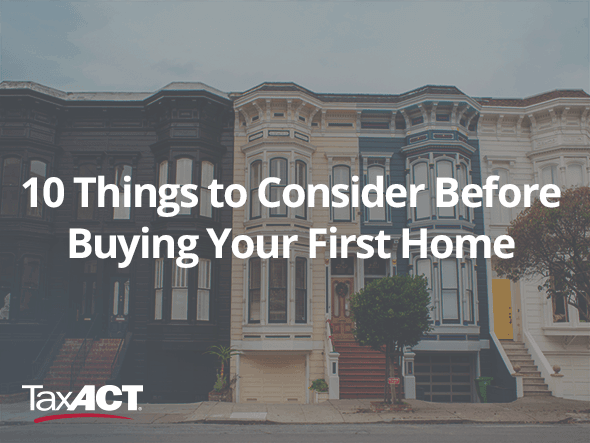
For most individuals and families, buying a home is the largest purchase they will ever make.
While buying a home can be a great investment, it must be done with great caution, planning and comparison shopping.
What is the best time to buy? How can you get the lowest interest rate on a mortgage? How much should you save up for a down payment?
We have compiled a list of 10 things you should know before taking the plunge into buying your first home.
Is this a "buyer" or market "vendor"?
house prices can vary considerably depending on the demand and supply of housing in your area.
When the economy is strong and unemployment is low, more people are looking for homes. If there is a shortage of available housing, prices tend to rise.
This is known as a "seller's market."
As a potential buyer, it is best to shop around during a crisis in housing prices when demand is low and prices are reduced.
In some parts of the country, home prices generally remain stable. Start by researching trends in the real estate market in your area.
Understand the process.
Buying a home is different from buying a new TV.
Since most buyers do not have hundreds of thousands of dollars saved to pay for the house in cash, you'll need to get a mortgage
Here are the general steps in the process of buying a house .:
- Save enough for a down payment, usually 20% of the value of the house.
- pre-approval application for a mortgage how much house you can afford.
- once you find a place you like, make an offer.
- If the seller accepts your offer, sign a purchase contract with a non-refundable deposit.
- officially apply for the mortgage loan and hire a home inspector to ensure that the house is in good condition.
- Attending the closing, during which you sign all the mortgage documents, make the down payment and get the keys.
Figure out what you want from a home.
Before contacting a realtor or browsing online ads, sit down with your spouse, partner or family to know exactly what you are looking for a house
Location is a critical consideration -. city suburbs in the country, closer to work? How many bedrooms and bathrooms do you need? Do you want extra space for an office of the workshop or at home? How about parking or a garage for two cars?
You can not find a house with absolutely everything on your wish list, but identifying your priorities is a good place to start.
Determine what you can really afford.
Get a mortgage pre approval is an important step towards knowing the maximum you can afford to pay each month.
But not all mortgages are structured the same.
Does your monthly mortgage payments include property taxes and home insurance payments? Is that the fixed interest rates, or will they adjust to a certain number of years? What about closing costs?
These can be significant depending on the lender and attorney fees or other payments required. Take all of these costs into account when determining what you can reasonably afford to pay.
And remember, just because you are pre-approved for a maximum amount does not mean you have to spend the maximum!
Check your credit report and your credit score.
your individual credit score will affect the interest rate you are offered by potential mortgage lenders.
The credit score is largely based on your credit history, which is detailed in documents called credit reports
All Americans are entitled to one free copy of their credit report each of the three major credit reporting companies :. Experian, TransUnion and Equifax®.
Save your deposit.
more you can offer as a down payment on a home, the less you need to borrow from a bank.
by lowering the principal of your loan, you can also significantly reduce the amount you pay ultimately for the benefit.
traditional mortgage lenders such as commercial banks generally require payment 20% down, but lower rates can be found by the Federal Housing Administration or Veterans Administration.
If a family member wants to help with your down payment, make sure you get a signed gift letter to confirm it is not a secondary loan.
Does your home fit your work?
when you work and how much you earn are extremely important factors when buying a house
The lenders will not want just to know your monthly income, but also how long you worked at your current job
stable income is essential to pay a mortgage.
And your journey?
Think twice before buying a home that is an hour or more from your workplace.
long journeys can try your sanity and cost a fortune in gas. If you work from home, you will need space for a home office dedicated.
Are you for a fixer-upper?
When house prices are rising, you might be tempted to invest in a fixer-upper.
If you are handy, you can pay less up front, make repairs yourself and upgrades, and sell at a handsome profit.
But fixing a house takes seriously the time, skill and dedication. Even if you buy a newer home, set aside room in your budget for maintenance costs and unplanned repairs.
If you're not confident in your fix-it skills, you could ask your Realtor to negotiate a home warranty with the seller.
under a warranty, repairs of existing equipment such as pipes, appliances and roofs are covered for at least one year.
beyond this first year, you can pay a fixed rate to extend the warranty.
schools and other kid-friendly considerations.
since public schools are funded largely by local property taxes, school quality can vary considerably from one quarter to the next.
Since the best school districts generally have higher property taxes (and prices higher houses), this is something parents should consider when shopping.
Are you willing to trade a smaller home to a better school district?
other considerations for families include the nearby parks, playgrounds and swimming pools, traffic and sidewalks, and the overall safety of the neighborhood.
rooting.
the best time to buy a house is when you know that you will live in the same area for at least the next five years.
you have a stable job with promotion potential. Do you have children or are planning to start a family. You have family or good friends in the area that provide a strong sense of community.
If you are dissatisfied with your work or itching to move to another part of the country (or the world), it's probably not a good time to buy.
If you decide to move, you might not be able to sell the house quickly, and if you sell within two years after purchase, you will pay taxes on the profits you make of the sale.


0 Komentar